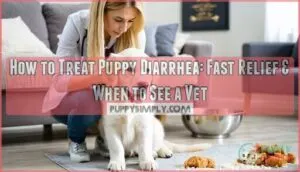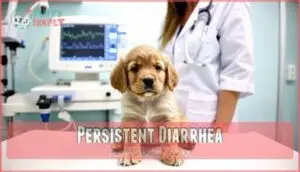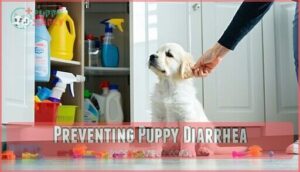This site is supported by our readers. We may earn a commission, at no cost to you, if you purchase through links.

Start by ensuring they stay hydrated, as diarrhea can quickly lead to dehydration. Offer small portions of a bland diet like boiled chicken and rice or plain pumpkin to soothe their tummy.
Avoid their regular food or treats for now. Watch for warning signs like bloody stools, vomiting, or extreme lethargy—these mean it’s time to call the vet.
Keep their environment clean and stress-free, and make sure they’re not eating anything they shouldn’t. A little care goes a long way, but persistent issues may need professional help.
Table Of Contents
- Key Takeaways
- Causes of Puppy Diarrhea
- Treating Puppy Diarrhea
- Identifying Serious Symptoms
- Home Care and Remedies
- Preventing Puppy Diarrhea
- Veterinary Care and Support
- Frequently Asked Questions (FAQs)
- How do you treat a dog with diarrhea?
- What are the recommended treatments for diarrhea in dogs?
- Why do puppies get diarrhea?
- Are probiotics good for dogs with diarrhea?
- What foods and treats are best for dogs prone to diarrhea?
- How much exercise should I give a puppy with diarrhea?
- Are probiotics or digestive enzymes helpful for diarrhea?
- How do I disinfect my home after a bout of infectious diarrhea?
- How long after diarrhea resolves should I wait to re-start training?
- Can teething contribute to puppy diarrhea?
- Conclusion
Key Takeaways
- Keep your puppy hydrated and offer a bland diet like boiled chicken and rice or plain pumpkin to soothe their stomach.
- Watch for serious symptoms like bloody stools, vomiting, or lethargy, and contact your vet if these occur.
- Gradually transition diets to prevent digestive upset and stick to a deworming and vaccination schedule for long-term health.
- Use probiotics to restore gut health and monitor your puppy’s recovery closely to ensure improvement.
Causes of Puppy Diarrhea
Your puppy’s loose stools can stem from several common causes, ranging from simple dietary changes to more serious infections.
Loose stools in puppies often result from dietary changes or infections—quick action ensures their health and happiness.
Understanding these triggers helps you determine whether you’re dealing with a minor stomach upset or a condition that requires immediate veterinary attention.
Common Triggers and Stressors
Everyday stressors can trigger puppy diarrhea faster than you’d expect.
Your pup’s sensitive digestive system reacts quickly to environmental changes, making stress a common culprit behind upset stomachs.
Common stress-related triggers include:
- Environmental stress from moving homes or new surroundings
- Dietary indiscretion when puppies eat garbage or mystery snacks
- Sudden changes in routine or household dynamics
These stressors disrupt normal digestion, causing loose stools.
Dietary Changes and Allergies
Switching your puppy’s food too quickly can trigger diarrhea within hours.
Food intolerance to protein sources like chicken, beef, or dairy often causes digestive upset. Allergy symptoms include loose stools and stomach discomfort.
Always use gradual introduction when changing puppy diet – mix old and new food over seven days. A proper diet shift prevents food sensitivity reactions, ensuring a smooth transition to a new diet is crucial for preventing digestive upset.
Bacterial and Viral Infections
Bacterial infections like E. coli and Salmonella exposure are common puppy diarrhea causes, spreading through contaminated food, water, or contact with infected animals.
Viral infections, such as parvovirus, can be life-threatening, showing severe parvo symptoms like bloody stools and lethargy.
One frequent cause is sudden dietary changes, which can upset a puppy’s sensitive digestive system.
Prioritize viral prevention with vaccinations and seek bacterial treatment immediately to prevent complications, ensuring early puppy diarrhea treatment is essential.
Parasites and Worms
Intestinal parasites like roundworms, hookworms, and protozoal infections such as giardia and coccidia in puppies are common causes of diarrhea.
A fecal exam helps identify these culprits.
Stick to a deworming schedule and use preventative medications to protect your pup.
Broad-spectrum medications are often used to treat worms.
Deworming puppies early is essential for puppy diarrhea treatment, ensuring long-term health and reducing risks of reinfection.
Treating Puppy Diarrhea
When your puppy’s upset stomach strikes, quick action can make all the difference.
Quick action and a bland diet can soothe your puppy’s upset stomach and help them bounce back faster.
Start with a bland diet for your puppy—boiled chicken and plain white rice often work wonders.
Plain canned pumpkin is another great option; its fiber helps firm up stools.
Keep fresh water available at all times to prevent puppy dehydration, and consider adding a puppy probiotic to restore gut balance.
Probiotics can help reduce inflammation and support digestion.
Temporary fasting for 12-24 hours may help settle their stomach, but don’t extend it without veterinary advice.
If diarrhea follows deworming, it’s often a temporary side effect.
For long-term management, talk to your vet about dietary supplements or alternative therapies.
Always monitor for worsening symptoms, and remember that mild cases often improve with these simple steps, using plain canned pumpkin and ensuring fresh water is available to prevent puppy dehydration.
Identifying Serious Symptoms
It’s important to recognize when your puppy’s diarrhea might signal something serious.
Symptoms like bloody stools, vomiting, or extreme lethargy shouldn’t be ignored and may require immediate veterinary attention.
Bloody Stools and Vomiting
Bloody stools and vomiting in puppies are red flags needing immediate attention.
Look for these signs:
- Bright red blood indicates active bleeding; black, tarry stools suggest internal bleeding.
- Frequent vomiting raises dehydration risks and signals severity.
- Combined symptoms may point to parvovirus or toxin ingestion.
- In cases of vomiting, hematemesis in dogs can also be a serious concern.
Visit an emergency veterinary hospital if puppy diarrhea blood or persistent vomiting occurs, as these are clear indicators of a serious condition.
Lethargy and Dehydration
Recognizing lethargy in a puppy with diarrhea is vital, as it often signals dehydration.
Check for dry gums, sunken eyes, or poor skin elasticity—signs of an electrolyte imbalance.
If your puppy seems lethargic, act quickly to offer small amounts of water or a vet-approved electrolyte solution to aid fluid replacement.
Monitoring recovery closely guarantees your puppy regains energy and hydration.
Fever and Weight Loss
Fever signs like a warm nose or lethargy often signal infections or inflammation.
Weight loss causes include dehydration risks and underlying conditions like severe puppy diarrhea.
Appetite changes, especially if your puppy’s not eating, can worsen the problem.
If your puppy seems lethargic, vomiting, or losing weight rapidly, it’s time to call the vet for immediate care.
Persistent Diarrhea
Persistent diarrhea can wear down your puppy’s quality of life.
When it lasts over 48 hours, it might signal chronic diarrhea linked to underlying conditions like parvovirus or giardia in puppies.
A diagnostic approach, including fecal tests, helps pinpoint the cause.
Left untreated, it risks dehydration and malnutrition.
Bloody diarrhea or mucus needs urgent vet care for long-term management, especially to address conditions that may lead to malnutrition.
Home Care and Remedies
When your puppy has diarrhea, simple home remedies can often provide quick relief. A bland diet, proper hydration, and a bit of patience can help their tummy settle down.
Bland Diets and Pumpkin
A bland diet for puppy diarrhea can work wonders.
Pumpkin benefits digestion with its fiber and prebiotics, helping firm up loose stools.
Stick to plain, canned pumpkin (not pie filling).
Cottage cheese or mashed potatoes (without skin) are also great bland food options.
Many owners find pumpkin can help with their puppy’s digestion.
- Pumpkin for dogs: 1–3 teaspoons per meal.
- Rice options: White or sweet potatoes.
- Probiotic strains: Aid gut health.
Boiled Chicken and Rice
Boiled chicken and white rice is a classic bland diet for a puppy’s upset stomach. Use skinless chicken breast and plain rice, avoiding seasonings. Stick to small portion sizes to prevent overfeeding.
This recipe variation is gentle and easy to digest, offering nutritional value while soothing puppy diarrhea. Long-term use isn’t ideal—consult your vet for alternative options if symptoms persist.
| Step | What to Do | Why It Helps | Tips |
|---|---|---|---|
| 1. Boil Chicken | Use skinless chicken breast. | Gentle on sensitive stomachs. | Avoid spices or oils. |
| 2. Cook Rice | Use plain white rice. | Easy to digest carbohydrates. | Rinse before cooking. |
| 3. Serve Small | Offer small portion sizes. | Prevents overwhelming digestion. | Start with a tablespoon. |
| 4. Monitor | Watch for symptom changes. | Tracks improvement or concerns. | Contact vet if no progress. |
Probiotics and Hydration
Probiotics can restore gut bacteria and improve gut health, making them a great option for puppy diarrhea.
Look for probiotic strains designed for dogs, like FortiFlora.
You can find puppy probiotics online.
Keep fresh water available to prevent dehydration, and monitor water intake closely.
For electrolyte balance, try diluted Pedialyte under veterinary guidance.
Watch for dehydration signs like lethargy or dry gums, and consult your vet if needed.
Temporary Fasting
A short fasting duration, typically 12 to 24 hours, can help reset your puppy’s upset stomach.
During this time, make certain steady water intake to avoid dehydration, especially for younger puppies.
After fasting, use a gradual reintroduction strategy with a bland diet like boiled chicken and rice.
Monitor for underlying conditions, as prolonged puppy diarrhea may need veterinary attention for proper puppy health care.
Preventing Puppy Diarrhea
Preventing puppy diarrhea starts with keeping their environment clean, their diet consistent, and harmful items out of reach.
By staying proactive with vaccinations, parasite control, and gradual diet changes, you can protect your pup’s sensitive stomach.
Vaccinations and Parasite Control
Keeping your puppy healthy starts with a proper vaccination schedule and regular deworming frequency.
Vaccinations protect against parvovirus symptoms and other serious illnesses, while antiparasitic medication tackles common threats like Giardia.
Vaccination costs can vary widely.
Parasite prevention also reduces zoonotic risks for your family.
Pair this with good environmental hygiene to keep your puppy’s space clean and safe from harmful parasites.
Secure Food and Waste
Secure your garbage cans tightly to prevent curious pups from turning them into snack bars.
Puppy-proofing tips like using lidded bins and keeping cleaning products out of reach are essential.
Dispose of waste properly to avoid accidental ingestion of harmful items.
For your puppy’s food, consider using an airtight food container to maintain freshness.
Preventing scavenging and monitoring ingestion reduces the risk of puppy diarrhea, ensuring better hygiene and overall puppy care.
Clean Environment and Supervision
Maintaining a clean environment is essential for puppy care and preventing diarrhea.
Supervise chewing to avoid harmful ingestion, and practice proper hygiene to reduce risks. Use safe cleaning products and dispose of waste promptly.
Keep toxic substances out of reach and guarantee safe surroundings. These steps prevent ingestion of harmful items, promoting a healthier, happier puppy.
Gradual Diet Transitions
After securing a clean environment, focus on gradual food changes to prevent puppy diarrhea.
Use a Phased Timeline, mixing small amounts of new food with the old. This helps ease puppy food sensitivity and spot any food intolerance or allergy introduction.
Monitor stool for changes, practice Portion Control, and make certain the diet change is slow to avoid upset stomachs, ensuring a smooth transition with minimal risk of introducing food intolerance.
Veterinary Care and Support
If your puppy’s diarrhea persists or is accompanied by concerning symptoms like lethargy or vomiting, it’s time to call your vet.
Prompt professional care guarantees your pup gets the right treatment to recover quickly and safely.
When to Call The Vet
If your puppy’s diarrhea comes with persistent symptoms like lethargy, vomiting, or not eating, it’s time to see the vet.
Watch for tarry stools, signs of severe dehydration, or if your puppy’s age makes them more vulnerable.
Ingested toxins or worsening diarrhea also demand immediate care.
- **Bloody or black stools signal danger.
- **Puppy vomiting alongside diarrhea needs urgent attention.
- **Lack of appetite or energy isn’t normal.
Diagnostic Tests and Treatment
When your puppy’s diarrhea raises concerns, a vet may recommend tests like feces analysis or blood analysis to pinpoint the cause.
Stool samples help identify parasites or infections like parvovirus.
Blood tests can reveal dehydration or bacterial issues.
Based on findings, treatments like fluid therapy or specific medication types, including antibiotics, may be prescribed to restore your pup’s health.
Antibiotics and Anti-Parasitic Medications
Antibiotics and anti-parasitic medications are essential for treating puppy diarrhea caused by bacterial infections or parasites like Giardia.
Your vet might prescribe broad-spectrum antibiotics or preventative antibiotics, but dosage considerations are key to avoiding medication side-effects and antibiotic resistance.
Always follow your puppy diarrhea vet’s guidance, as improper treatment can worsen symptoms or fail to address the underlying issue effectively, which can lead to antibiotic resistance.
Intravenous Fluids and Hospitalization
If dehydration becomes severe, intravenous fluids at an emergency veterinary hospital might be the best option.
This dehydration treatment restores electrolyte balance while monitoring signs closely.
Though hospitalization costs can add up, it guarantees your puppy receives expert care.
Post-treatment care often includes dietary adjustments and follow-ups with your puppy diarrhea vet to prevent future issues and support recovery.
Frequently Asked Questions (FAQs)
How do you treat a dog with diarrhea?
When your dog has diarrhea, start with a 12-24 hour food fast to let their stomach settle.
Offer small amounts of water frequently to prevent dehydration, then introduce a bland diet like boiled chicken and rice.
What are the recommended treatments for diarrhea in dogs?
Start by offering a bland diet like boiled chicken and rice, make certain constant access to fresh water, and monitor for improvement.
If diarrhea lasts over a day, includes blood, or worsens, contact your vet immediately.
Why do puppies get diarrhea?
Puppies get diarrhea from stress, sudden diet changes, or eating things they shouldn’t, like garbage.
Food intolerances, bacterial infections, parasites, or even teething can upset their sensitive stomachs, making them prone to digestive issues.
Are probiotics good for dogs with diarrhea?
Ever wonder if probiotics actually help?
They do! Probiotics restore healthy gut bacteria, easing diarrhea and promoting digestion.
Use dog-specific options like Fortiflora, but always check with your vet to confirm it’s the right fit.
What foods and treats are best for dogs prone to diarrhea?
Stick to bland, easy-to-digest foods like boiled chicken, plain white rice, or mashed sweet potatoes.
Avoid fatty or spicy treats.
Probiotics and plain canned pumpkin can help too, but always switch diets gradually.
How much exercise should I give a puppy with diarrhea?
Limit exercise to short, gentle walks or supervised play to avoid straining your puppy’s already sensitive system.
Overexertion can worsen dehydration or stress, so keep activities calm and make certain plenty of rest and hydration.
Are probiotics or digestive enzymes helpful for diarrhea?
Did you know probiotics can reduce diarrhea duration by 25% in dogs?
They restore gut bacteria balance, aiding digestion.
Digestive enzymes help break down food, easing stress on your puppy’s tummy for faster recovery.
How do I disinfect my home after a bout of infectious diarrhea?
Disinfect surfaces with a pet-safe cleaner, focusing on floors, bedding, and feeding areas.
Wash fabrics in hot water. Use gloves, and clean bowls with boiling water.
Dispose of waste properly to prevent reinfection or spread.
How long after diarrhea resolves should I wait to re-start training?
Once the storm has passed and your puppy’s stools are normal for 48 hours, you can ease back into training.
Start slow, keeping sessions short to avoid overwhelming their still-recovering digestive system.
Can teething contribute to puppy diarrhea?
Yes, teething can cause puppy diarrhea.
The stress of teething, combined with chewing on unfamiliar objects, might upset their stomach.
Keep an eye on their chewing habits and offer safe, puppy-friendly toys to help.
Conclusion
Imagine your puppy eating something they shouldn’t, leading to an upset stomach.
If diarrhea strikes, act quickly—keep them hydrated and offer a bland diet like boiled chicken and rice.
Monitor for serious symptoms like bloody stools or vomiting, and don’t hesitate to call the vet if needed.
Knowing how to treat puppy diarrhea can make a big difference in their recovery.
With care, patience, and attention, your furry friend will be back to their playful self soon.
- https://petzview.com/articles/stop-puppy-diarrhea-guide/
- https://dependondogs.com/dog-health/how-to-treat-puppy-diarrhea-causes-and-solutions/
- https://www.americanbreeder.com/resources/american-breeder-blog/dogs/dog-diarrhea-management-tips
- https://dremmanuelfontaine.com/2024/02/06/what-do-you-give-a-puppy-for-diarrhea/
- https://myzootopia.com/articles/treating-diarrhea-in-dogs/













